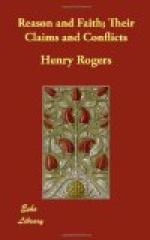The proofs of design, arising from the relations thus maintained between all the parts, from the most minute to the most vast, of our own world, are still to be further multiplied by the inconceivably momentous relations subsisting between our own and other planets and their common centre; amidst whose sublime and solemn phenomena science has most clearly discovered that everything is accurately adjusted by geometrical precision of force and movement; where the chances of error are infinite, and the proofs of intelligence, therefore, equal. These proofs of design in each fragment of the universe, and in all combined, are continually further multiplied by every fresh discovery, whether in the minute or the vast—by the microscope or the telescope; for every fresh law that is discovered, being in harmony with all that has previously been discovered, not only yields its own proof of design, but infinitely more, by all the relations in which it stands to other laws: it yields, in fact, as many as there are adjustments which have been effected between itself and all besides. Each new proof of design, therefore, is not a solitary fact; but one which entering as another element into a most complex machinery, indefinitely multiplies the combinations, in any one of which chance might have gone astray. From this infinite array of proofs of design, it seems to man’s reason, in ordinary moods, stark madness to account for the phenomena of the universe upon any other supposition than that which docs account, and can alone account, for them all,—the supposition of a Presiding Intelligence, illimitable alike in power and in wisdom.
The only difficulty is justly to appreciate such an argument to obtain a sufficiently vivid impression of such an accumulation of probabilities. This very difficulty, indeed, in some moods, may minister to a temporary doubt. For let us catch man in those moods,—perhaps after long meditation on the metaphysical grounds of human belief,—and he begins to doubt, with unusual modesty, whether the child of dust is warranted to conclude anything on a subject which loses itself in the infinite, and which so far transcends all his powers of apprehension; he begins half to doubt, with Hume, whether he can reason analogically from the petty specimens of human




